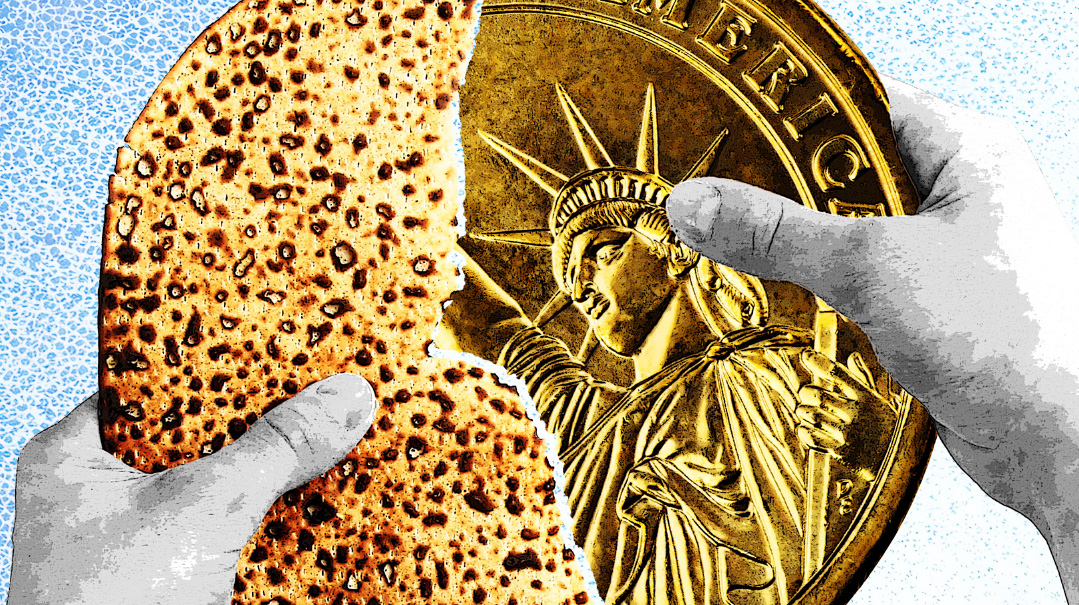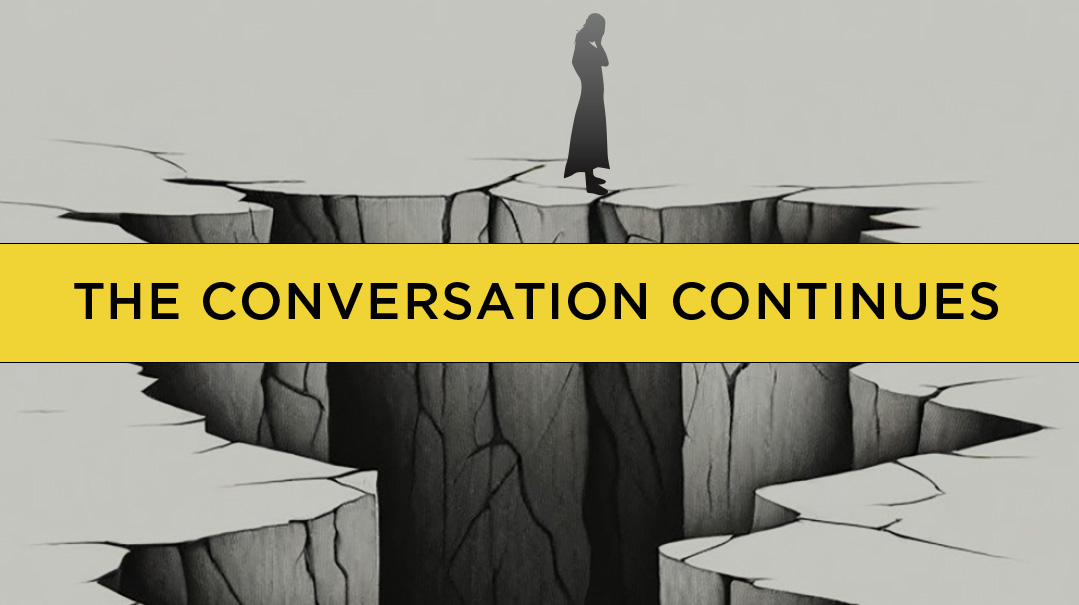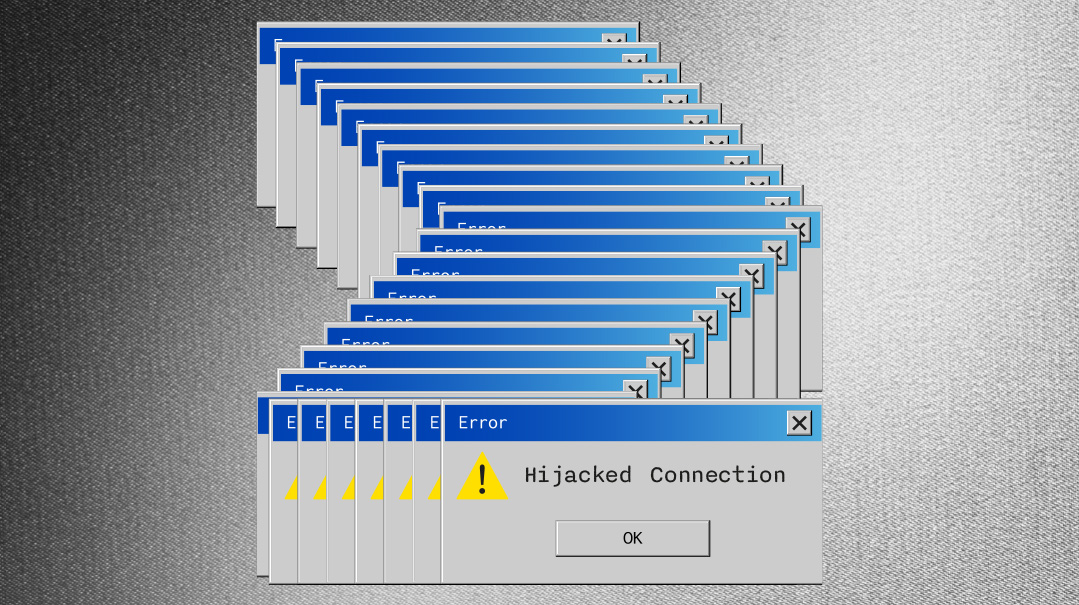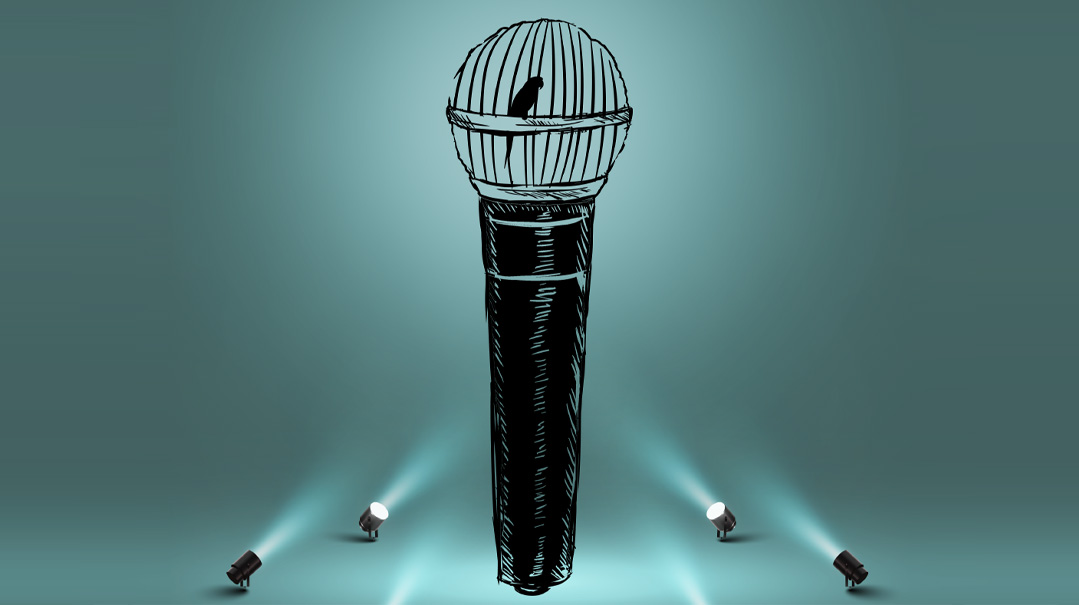None of Your Business
| May 24, 2022"We keep our religion quiet at the office — why are you rocking the boat?"

“We are hiring!”
I saw the boss’s post when I checked the work chat while getting a coffee. It was nice that they were hiring. So many people I knew were looking for jobs. And it was good news that the company was growing enough to hire new staff.
Underneath the ad, Mr. Smithson had written: Referral bonus for any employee who refers a winning candidate to the team. Details by email.
Referral bonus? That was cool. And hopefully, easy to win.
I screenshot the image and posted it on my WhatsApp status. Lots of good aspiring frum accountants out there would jump at a position in a growing firm in the city. I was lucky; Smithson & Grant was a great place to work, very understanding of things like leaving early on Fridays and taking off Yom Tov. There were a few of us in the office, Sam Green had been there even before me, a few others had joined us over the years, and none of us had ever experienced any trouble as religious Jews.
I checked my status — over 60 views already. Maybe the new hires would be people I knew. That would be nice. And, of course, the bonus wouldn’t hurt at all.
Interview week meant the boss was holed up questioning candidates with a couple of the company executives, with a prominently displayed “meeting in progress” plate on his door. For some reason, the group of hopefuls hanging around the outer office put everyone a little on edge. Even Adam in the next cubicle, who doesn’t stop talking, seemed subdued.
“Who’s looking forward to these new hires just making their appearance already?” he asked, when a few of us lingered by the watercooler after lunch.
“Not me,” Brian from HR laughed.
Right — HR gets loaded with all the paperwork, training, onboarding stuff when new employees join. And here the boss was hiring — what, three, four new guys at once? Fun.
“It’ll be over soon,” I offered, and he gave a small smile.
I soon found out, though, that the new hires weren’t only going to be Brian’s headache.
“Dan?” Brian poked his head into my cubicle. There was a tall, thin guy who looked barely out of high school hovering uncertainly behind him.
“This is Brad. He’s starting out here as a junior accountant. Will you show him around a little? Guy’s doing it for the other new hire.”
“Sure.” I stood up. I doubted Brad was hired on my referral — he didn’t look like the sort of person who’d be on my contact list — but giving a little company tour was a break from crunching numbers. And besides, welcoming a new employee graciously was part of our company culture.
Brad blinked eagerly, stumbled a little as he crossed the room to shake my hand, and seemed overly enthusiastic about everything I showed him. I wondered who Guy was showing around, if he was as preppy as my new recruit.
I didn’t have to wonder long. We met up in the kitchenette — when Brad and I came in, Guy was standing there, a suited man with a large yarmulke nodding at his side.
“Hey, Danny, whaddaya know, it’s one of your lot!” Guy crowed when he saw me.
I tried not to wince at the phrasing. At work, we religious Jews had a modus operandi I could best describe as lie low. We tried to blend in, not to make a big deal about the fact that we were Jewish. Okay, we wore yarmulkes and left early on Fridays, but other than that, we tried not to act like some sort of group or club within the walls of Smithson & Grant.
The frum man, on the other hand, lit up when he saw me. “Aahhh, vus machst di, shalom aleichem! I’m Yanky Rosner.”
Guy was staring as if we were talking in a foreign language. Oh, right, we were.
“Nice to meet you, Yanky. I’m Danny Gordon.” I deliberately spoke in English. No need to have anyone think we were muttering about them in some Jewish secret code.
He looked surprised — I guess “nice to meet you” isn’t typical yeshivah vernacular, and he looked fresh out of the system… but never mind, he’d learn.
“Looks like a great place, huh?”
“Yes, you’re definitely lucky to be here.” I smiled politely, trying to signal with my eyes: This is weird. Don’t be too heimish, too fast. This isn’t the shtibel coffee room. “Well, I’ll be going on now — I don’t want to keep anyone. Brad—” I remembered him. “This is Yanky, and this is Guy. Guy and Yanky, this is Brad.”
“Nice to meet you,” Guy murmured.
Yanky just nodded. “Very nice, very nice.”
Wow, he needed to learn some workplace etiquette. Shame I wasn’t the one training him in.
Or maybe not.
When I took a break for lunch, I discovered that Yanky Rosner wasn’t the only one of “our lot” to have joined the team at Smithson & Grant. Wow, my post must’ve gone viral. I hoped I could cash in on the referral bonus.
“Nice to meet you, Pinny,” I said, shaking hands with a short man sporting dark peyos and a neat beard.
Yanky came over, clapped Pinny on the back, and offered me a warm smile. “So, we have ten here?”
“Ten…?” I stared at him, blankly.
“Ten. A minyan. For Minchah.”
“Oooh.” I shook my head. “Look, there’re a few of us, not that many, but anyway, we always go out for Minchah. There’s one round the corner that starts in about 20 minutes, so it’s perfect for lunch break, in—”
Pinny was busy on his phone, but Yanky waved a dismissive hand. “I don’t see why we need to do that, we could have one right here. There’s a conference room with some space at the back, it would be perfect. And much more convenient, no? That fellow — Guy or whatever his name is — told me that the room is never really in use in the afternoons.”
I shrugged, uncomfortable. “Look, it’s not what we do… I don’t know if people would be comfortable with us using a conference room for that…”
“Worth a try, though, no?” Yanky persisted. “Look, I’ll take care of the arrangements, ask the boss or whatever. If you could just let me know where all the frum guys are sitting…”
“I don’t — I don’t know.” The idea made me nervous, but it was hard to explain why. On the other hand, if I didn’t, Yanky Rosner and his sidekick were liable to march up and down every cubicle looking for yarmulkes.
I took a deep breath. I’d have to give it a try, explain the quiet, under-the-radar culture we’ve made sure to develop here.
Pinny looked up from his phone unexpectedly. I hadn’t realized he was listening. “A friend who works down the block will join the minyan if we make one.”
“Great, that’s already four. And there’s that guy you met before, I’ll ask him now.”
Three coworkers came in together. I closed my mouth; there was no explaining anything now.
Hopefully I could catch Yanky and explain things before too much harm would be done.
But apparently, the guy worked fast.
Too fast.
The next morning, he’d already posted in the internal work chat room — the one that the entire company follows, the one I think ten times before posting to — his own little announcement: Minchah in conference room 4 at 1:45.
There were several comments in the thread — most of them question marks or confused emojis. One response from Mark Cohn, a nice guy who works as staff accountant: Tx.
I dropped my forehead into my hands. No. No, no, no.
What does he think this is, a yeshivah WhatsApp group?
It was time for some serious damage control. I stood up, trying to remember if he’d mentioned where exactly his desk was. I had to find him, get him to the take down the message.
A notification popped up in the corner of the screen:
YankyRosner is typing…
A moment later, a new message popped up in the thread.
Sorry for the unclarity. It’s afternoon prayer services for Jewish employees.
Unclarity??! Was that even a word?
I groaned aloud.
Adam in the next cubicle looked up.
“Hey, Danny. What’s this about prayer services? You never do that, usually, do you?”
Here we go.
“Sure I do,” I said, trying to keep my tone casual. “I just went out for it during lunch break, that’s all.”
“Oh.” He looked back at the screen, then winked at me. “Looks like you got a Jewish powerhouse arranging in-house services now. Enjoy.”
I forced a smile.
But it was the fridge that was really over the top.
Minchah was happening; there was nothing I could really do about it, though I made sure Yanky knew not to post on the public work chat about it anymore. Instead, after the first day, we created a Smithson & Grant Minyan Group on WhatsApp, kept the updates there.
I still cringed at the way some of the guys liked to daven, mainly Yanky and Pinny and their friends who joined from other offices nearby: so slow, so loud. I found myself praying with real kavanah that people — especially Mr. Smithson — shouldn’t walk past.
Occasionally, a coworker would come inside to get something, set up a projector or whatever, and he would stare openly at the group of us swaying in a corner, one of the guys standing upfront and chanting out loud. I’d feel his wondering gaze, and my body would tense up. Why did we have to set ourselves apart so openly? Invite the stares, the comments, the anti-Semitism that had never been a part of our workplace, but would be more likely to come now that we were being so obvious about our religion?
But if the in-house Minchah was a low-level headache on a daily basis, the fridge situation was a full-blown migraine.
I entered the kitchen one morning to put my lunch in the fridge and found a new addition prominently placed under the window. A small fridge, padlocked (padlocked??), sporting a printed sign: “Kosher Fridge. Code is גירת.”
A couple of guys were standing ogling it. One of them, Kyle, looks pleased to see me.
“Oh — Danny, you can tell us. What’s this all about? You keep kosher, right? Do you need a kosher fridge? You’ve never had one before.”
Here we go.
How to explain this?
“It’s not — strictly necessary. Just to, to prevent food mix-ups,” I stuttered.
“But we all label our lunches.” They looked genuinely confused.
I didn’t know what to say.
“Maybe because there’s so many of you guys now, they figured it would be easier to keep separate,” someone offered.
So many of you guys.
That was the problem.
It wasn’t supposed to be “us” and “them.” We’d worked together for years, acted polite, not caused problems. A locked fridge just for the Jewish employees? Why ask for trouble?
I left the kitchen, my lunch still in my hands, and headed straight for Yanky.
“Can we speak a minute?” He smiled genially, seemingly oblivious to the tension I was feeling, and got up to follow me.
Conference room 4 was dark and empty. A siddur lay haphazardly on the side table. We needed to keep this place clean. What if the boss had a meeting in here?
But first things first.
“The fridge,” I said. “What’s the story?”
“Oh, yeah.” Yanky nodded. “It’s Pinny’s thing. He likes his deli sandwiches, and it’s a problem of basar she’nisalem min ha’ayin, you know…”
I pressed my lips together. “So you just lugged in a fridge and plugged it in there? Without even checking with anyone?”
He opened his eyes wide. Okay, maybe my tone had been a little too sharp, but seriously? He needed to know this was not okay.
“Of course not. I spoke to HR, told them about our religious needs. They cleared it with the boss.”
“The boss!” I was aghast.
“Yeah, he didn’t offer to pay for the fridge, which was a shame, but he had no problem with us installing it.”
I groaned. What did he think this was, a luxury hotel? “Pay for it? But he provides a fridge. Why should he pay because you want your own?”
“Me?” He sounded outraged. “It’s all of us. You’re comfortable with your tuna bagel sitting next to Joe Shmoe’s ham sandwich from McDonald’s?”
Okay, this guy had seriously never been out of Lakewood. I spoke with exaggerated patience. “Why not? Mine is wrapped. His is wrapped. They never get within touching distance of each other. And that’s life. You never bought something from a supermarket that was on the same shelf as a treif item?”
“It’s different. Someone spills their, ich veis, shellfish juice or something, and the next thing we know my wife’s pareve salad container is treif. You know goyim, they wouldn’t be bothered about these things…”
The sheer unfairness of the statement rendered me speechless for a full 20 seconds.
“Our coworkers would never spill something in the fridge and not clean it up,” I said tightly.
Yanky shook his head. “Look, can I be straight with you?” he asked, rushing on before I could say anything. “You’ve been here a while, and I think maybe, you know, you’ve stopped seeing how Yidden are, well, different. We aren’t supposed to be socializing and becoming a part of the goyishe culture. You know?”
“Sharing a fridge isn’t socializing, and neither is showing basic politeness,” I snapped back. Whoa, what was happening to me? I’ve worked here for years without getting into so much as an argument, and now a frum guy joins and I’m fighting with him?
“Of course we want to be polite,” Yanky said. “That’s why we ask permission from the boss, and we do everything in our own time and with our own money…” He looked at his watch pointedly. “And speaking of time, it’s company time now, we should probably be at our desks.”
I stared after him in frustration. Asking permission to install a personal fridge totally wasn’t the point. But if he didn’t get it now, he probably never would.
If I could tell Yanky one thing, it would be: You’re new to the company, and this isn’t the way we do things here. How can you come in, turn things upside down, and make it uncomfortable for the rest of us?
I got the job.
I read the email again, hardly believing it.
I got the job. At Smithson & Grant. The one that the entire cohort graduating from the intensive accounting course had applied for.
They’d had a few positions open, but it seemed only two of us landed them: Pinny Schnall was the other. At least there’d be two of us.
“Two of us?” Pinny snorted. “This is New York. We’re gonna have a whole bunch of frum coworkers. I think my cousin’s cousin, Goldstein, works at Smithson’s. Shua, maybe? Shmuli?”
“Wow. That would be nice. They’ll probably have a Minchah minyan there, then.” I thought a moment. “Maybe a shiur, too? I hope so. It’ll make sure I keep up with the daf.”
Pinny clapped me on the shoulder. “I’m sticking with the neitz minyan shiur, buddy, but you never know.”
I’m not sure what I’d been expecting, but somehow it was a surprise to come to work on the first day and not see a single frum person nearby. I was relieved when someone finally introduced me to a clean-shaven man wearing a yarmulke.
“Nice to meet you, I’m Danny Gordon,” he introduced himself.
I offered a hearty handshake. “Seems a great place to work, here.”
Danny blinked at me, then gave a small smile back. “Yes. You’re lucky to be here.” He turned to a young, eager-looking employee at his side. “Brad, this is Yanky, and this is Guy,” he said, making introductions all round.
Funny, maybe it was a workplace thing. But this Danny seemed… so formal. Cold. Maybe it’s just an accountant thing? (I’m not the accountant type, don’t tell my mother. But it’s a good Jewish profession, so there I was.)
I met another few Jews over the course of the day. To my surprise, though, there wasn’t even a minyan in place, let alone a daf yomi shiur. It seemed like no one had even thought of it.
“I think we’re at least seven here, we should do something,” I told Pinny.
He agreed with me. “If we want to make a minyan, I have friends working down the block.”
“Great,” I said. “Let’s get it going. It would be so much more convenient than leaving work every day.”
I asked Guy, who was training me in, whom I should speak to about it. It took some explaining — he didn’t seem to understand the concept of daily afternoon prayers.
“You have prayers every afternoon? Like you kneel on mats?” he asked.
“Nooo, that’s how the Muslims pray,” I said. “Actually, we kneel once a year, on the High Holy Days.”
Understanding dawned. “Oh, I know about those. In September, right? And then there’s Passover, when you eat matzah balls.”
“Yeah. You’ll be a real expert on Orthodoxy someday,” I said, high-fiving him. He looked startled but pleased.
“If you want to use a conference room for prayers, I don’t think anyone would mind. Check with Miles — he’s our supervisor,” he said.
We started the minyan for Minchah the next day — why wait on a good thing? Apparently, though, it was kind of a faux pas to post it on the company chat, even though Guy had assured me that it was open for anyone to post anything that they wanted to share.
Danny Gordon was the one who said something about it, too loudly, as soon as Minchah was over. “We can do a private WhatsApp chat, it’s not right to use the workplace forum for this.”
I didn’t see why not, but I had no problem switching. I commented that I didn’t think it was such a big deal, though.
“Look, you’re new here, maybe you don’t get the company culture,” Gordon said patronizingly.
“Yeah, there’s no need to make us look exclusive,” muttered Jack Stern, who I know for a fact goes by Yaakov in the real world.
I didn’t get it. Neither did Pinny. We talked it over with Pinny on the commute home — we took the subway together. “I think it’s because they’ve been here so long, they’re kind of immune to it, the difference bein Yisrael l’amim,” I said. “It’s like, they feel like they’re all friends, and they don’t want to offend anyone, chas v’shalom…”
“Well, we don’t want to offend anyone either,” Pinny said reasonably.
“Of course not!” I was taken aback. “But tell me, you think posting about Minchah is offensive?”
He thought for a moment. “Honestly? No, not really. But who cares, we have a WhatsApp chat now, let’s just forget about it.”
There was an invitation in my work email the next day, about a training event for new staff. It was scheduled for the next week, and it looked like it was going to be big — two full days, located in the Special Events room, complete with program and refreshments.
I RSVPed with a note requesting kosher food and received an email shortly after from Brian in HR.
Hey, Yanky. I saw your request for kosher at the event next week. Can you come down to my office to discuss?
Apparently, he told me, this had never been done before. There was no real protocol for getting separate catering for the frum contingent. I wondered what they’d all done until now.
“Look, I can give you a list of takeout places nearby that do deliveries, would that work?” I offered.
“That’s great. The company would be very happy to offer a kosher option for anyone who needs it,” Brian said. “Come to think of it, I don’t know why we haven’t done it before. We’ve had Jewish guys like you. I think they always just bought their own food, though.”
“That’s a shame,” I said. Especially when they could be getting takeout on the company budget.
“Yeah, we would’ve been happy to accommodate them. I guess they needed an ambassador. You could take the job.” He winked.
The Jewish ambassador. It had a nice ring to it. And I was happy to step forward and try make the workplace more frum-employee-friendly. Why not, when the management seemed genuinely happy to accommodate us?
“We really need a separate fridge,” Pinny told me one day. “I’m just not comfortable with the fridge situation there, everyone’s lunches crowded together… and that’s besides the fact that it gets complicated bringing anything meaty.”
“You can double-wrap and seal it,” I offered.
He snorted. “Who has time for that?”
I laughed.
“You think they’ll get us our own fridge?” Pinny asked.
I thought of how Brian had been so willing to organize a kosher menu for us. “Hey, that’s a great idea,” I said. “Let me speak to someone and find out.”
It turned out to be simpler than we thought. The boss had no problem with a kosher fridge in the kitchen; though he didn’t offer to pay for it, which was a bit of a shame. Oh, well. But Pinny had a mini fridge at home that they weren’t using, and he was willing to donate it to the cause. I ordered a fridge padlock on Amazon prime, and we printed a neat sign saying it was the kosher fridge, with the code — 613 — written in Hebrew beneath.
“That’s better,” Pinny sighed, stowing his deli sandwiches away.
It was definitely good to know that our kosher food was securely separate from the treif stuff in the large company fridge. I lingered for a moment, hoping that another one of the frum guys would come in. I was looking forward to their reactions.
But no one showed up, so I reluctantly headed to my desk. We’d probably get feedback later, maybe at Minchah.
In the end, it didn’t even take an hour.
When Danny Gordon showed up in the doorway with a grim expression, asking me to step outside to speak with him, I felt uncharacteristically nervous, though I kept a smile plastered on my face.
He’s not the boss, calm down, I told myself.
By default, we headed to the Minchah room, and I switched on the light.
“What’s up, Danny?”
He didn’t bother with niceties. “The fridge,” he said curtly. “What’s the story?”
The fridge? What was his issue with that?
“It’s… it’s Pinny’s fridge,” I said. “We decided to bring it in because, you know, deli sandwiches, and basar she’nisalem min ha’ayin.” I was stammering, and I hated it. Why did the guy get me so nervous?
“So you just lugged in a fridge and plugged it in the kitchen? Without even asking anyone’s permission?”
He sounded furious, and I felt myself getting angry too. What did he think he was, my principal? I took a deep breath, and forced myself to talk calmly.
“Of course not,” I said, hoping my voice sounded confident and soothing. “We spoke to HR. I told them about our religious needs. They were very accommodating, and they cleared it with the boss. He didn’t offer to pay for it, though.”
“The boss is involved?” Danny slapped his forehead. “And of course he wouldn’t pay for one. He provides a fridge. Why should he pay for you to have your own?”
“This isn’t about me, it’s all of us,” I said, trying to keep my voice even. “Everyone will be more comfortable with their kosher food separate from Joe Shmoe’s ham sandwich. And you know how it goes, someone spills their treif thing and it goes on the next person’s container…”
Danny argued, saying that the fridge was kept very clean, that it would never be a problem, but I’d just about had it. “Look, can I be straight with you?” I said finally. “You’ve been here a while, and I think maybe, you know, you stop seeing so much how Yidden are, well, different. We aren’t supposed to be socializing and becoming a part of the goyishe culture. You know?”
“Sharing a fridge is not socializing,” he retorted. “And what about basic politeness and decency?”
For goodness sake. This conversation had to end.
“We haven’t done anything that wasn’t polite or decent,” I said. “And speaking of decency… we’re on company time. We should probably be at our desks.”
I managed to avoid Danny for the next few days. It was easier once the two-day training event began, because we were in another wing of the building.
Brian had risen to the occasion; there was a large order from a nearby sushi place, and it was all designated for Pinny and I. A bunch of guys ogled our plates.
“Hey, Brian, can I get kosher too?” one of them asked.
“Yeah, they get sushi, no fair,” another mock-complained.
“You could get the kosher food, but you’d have to give up cheeseburgers for life,” Pinny said.
The crowd laughed. I looked around. No one seemed bothered or offended by our having kosher food on separate paperware.
I wished Danny Gordon were here to see. I wished I could explain that we could be proud about our Yiddishkeit and also keep communication open and respectful. We don’t need to hide behind apologies and pretend the divide doesn’t exist. That’s not what being a frum Jew is all about.
If I could tell Danny one thing, it would be: The way you’ve been doing things for years might not be the right way. What’s wrong with having our workplace be a place where we can practice Yiddishkeit comfortably?
(Originally featured in Mishpacha, Issue 912)
Oops! We could not locate your form.







